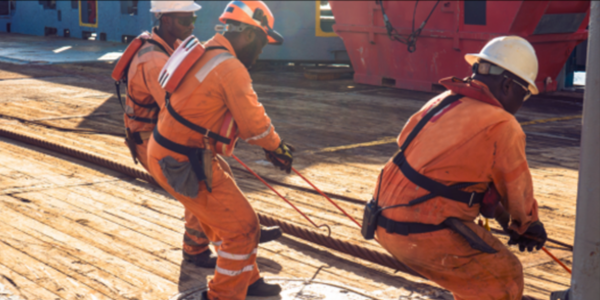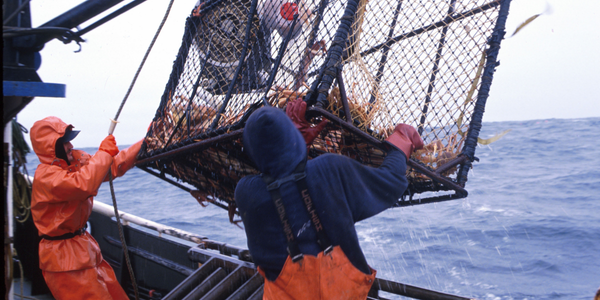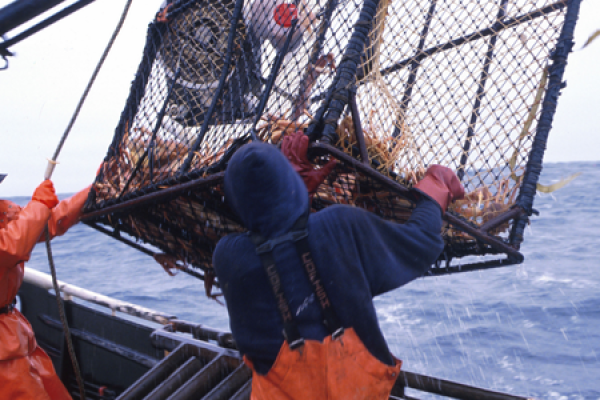
Taslim Imad
Published: March 07, 2025
Background:
Manual handling on commercial ships and fishing vessels involves physical activities such as lifting, carrying, moving, handling, pushing, or pulling of equipment by hand or bodily force, and it can result in musculoskeletal injury.
Crew members are more likely to sustain manual handling injuries in adverse weather conditions, particularly on fishing and smaller vessels. Incorrect manual handling can lead to accidents, injuries, and a range of health issues, including sprains and strains, fractures and dislocations, and musculoskeletal disorders, such as pain and discomfort in the back, neck, and limbs. Prolonged improper handling may also contribute to long-term conditions affecting mobility and overall well-being. Incorrect manual handling in adverse weather conditions could also result in slips, trips, and falls.
The Club has experienced a large number of crew injury claims arising from incorrect manual handling incidents, including the manual handling of mooring ropes, fishing gear (nets & crab pots), securing cargoes, moving heavy equipment, stores and provisions, spare parts, heavy tools, etc. The Club would like to remind Members and their crews of the risks posed by failing to adopt correct manual handling techniques.
This Risk Alert is intended to highlight key factors for consideration when undertaking manual handling activities on board vessels.

Possible Causes:
Manual handling operations are everyday activities on board any size and type of vessel, with risks compounded by the constant movement of ships. There is potential for injuries to crew members if proper training, risk assessments, and correct manual handling procedures are not followed.
Repetitive work routines and similar daily activities can lead to complacency among crew members.
Other possible causes of injury include repetitive high-force work activities, incorrect posture during manual handling, exposure to vibration, and handling loads that are unstable, unbalanced, or difficult to hold.
The risk of injury resulting from improper manual handling in adverse weather can increase the likelihood of slips, trips, and falls.

Preventative Actions:
There are some basic small and simple steps required before manual handling is undertaken, and their implementation is required in order to avoid and reduce the risk of crew injuries resulting from incorrect manual handling techniques.
- Avoid manual handling as far as practicable, utilise available lifting appliances and equipment
- A full Risk Assessment, toolbox meeting and proper planning should be carried out prior to any manual handling operation
- A work plan to include the characteristics of the load (weight, centre of gravity, heavier side, shape, size etc), physical effort, duration and a team assessment to ensure crew are adequately trained and fit for the job planned
- Personnel to understand, appreciate and respect their own capabilities and manual handling limitations
- Adequate supervision where appropriate
- Effective communication between all crew members before and during the operation
- Consideration of the working environment including:
- ship movement
- confined space
- location such as height, proximity to hot / cold surfaces, ship-side, sharp edges, physical obstacles such as steps or gangways, slippery decks etc
- high or low ambient temperature, and
- prevailing weather conditions.
- Clothing/PPE appropriate to the prevailing conditions to be worn
- Training to be provided, pre-employment or prior to undertaking manual handling activities
- Refresher training to be undertaken at regular intervals
Documentation & Reporting of Incidents:
- Detailed procedures with associated risk assessment
- Correct initial reporting of incidents to all relevant and concerned parties
- Full and detailed incident investigation to be undertaken (Root cause identification is an important tool in prevention of future incidents)
- Follow up reporting with updates and photographs where appropriate
- Log book entry – accuracy of record keeping
- Notification to vessel owners / operators
- Notification to Club’s local correspondents as appropriate and in accordance with Company procedures
The above guidance supplements other widely available industry guidance, which is not addressed in this risk alert.
Supportive Information
For further information on this or other Loss Prevention topics please contact the Loss Prevention Department, Steamship Insurance Management Services Ltd.
Tel: +44 20 7247 5490 Email: [email protected]
Resources
Risk Alert 111


